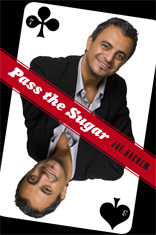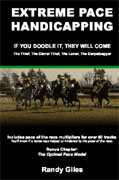
Pass the Sugar
by Joe Hachem
World champion Hachem talks about his arrival at the final table of the World Series of Poker, from his humble beginnings to his education and eventual illness that left him unable to practice his profession, to his wife's premonition that he would win the WSOP title even before he decided to play in the event. Lots of insight into his life and his game. 311 pages, hardbound, 2009.

Extreme Pace Handicapping
by Randy Giles
The author states that pace makes a race ONLY when horses are of equal talent and when they are not, the winner will come from studying older pace lines and applying his formulae to uncover the potential winner. This process can result in very nice overlays. 122 pages, paperbound, 2009.

Extreme Pace Handicapping; Colorful Hachem Poker Bio
Wednesday, August 05, 2009
The best payoffs Randy Giles ever had at a racetrack were generated by extreme pace aberrations. His book, Extreme Pace Handicapping (122 pages, paperbound, $19.95) is designed to uncover overlays Howard Schwartz, the "librarian for gamblers," is the marketing director for Gambler's Book Club in Las Vegas, a position he has held since 1979. Author of hundreds of articles on gambling, his weekly book reviews appear in numerous publications throughout the gaming industry. Howard's website is www.gamblersbook.com and it's a fresh new title at Gambler's Book Shop; it arrived just days after Joe Hachem's poker biography, Pass the Sugar (311 pages, hardbound, $25.95).
Howard Schwartz, the "librarian for gamblers," is the marketing director for Gambler's Book Club in Las Vegas, a position he has held since 1979. Author of hundreds of articles on gambling, his weekly book reviews appear in numerous publications throughout the gaming industry. Howard's website is www.gamblersbook.com and it's a fresh new title at Gambler's Book Shop; it arrived just days after Joe Hachem's poker biography, Pass the Sugar (311 pages, hardbound, $25.95).
For handicappers, pace is an extremely vital handicapping factor. Huey Mahl, Tom Brohamer, Howard Sartin, Tom Hambleton and others have emphasized pace in their books, and now Giles takes a different approach, underscoring offensive and defensive phases and comparing aerobic and anaerobic (with and without oxygen), keyed to the fact that "energy used early will not be available later." Also discussed is velocity and what the author calls a "pace pressure gauge."
Giles discusses speed figures, how to flag improving horses, pace ability, race quality, key races, pace shapes and credits William Quirin's out of print classic, Winning at the Races, Bob Heyburn's Fast and Fit Horses and William Scott's Investing at the Racetrack with some of his theories-all well and good, since these are solid, accepted authors' conclusions. "A horse's running style cannot be forced. It's natural to the animal and will develop in time," Giles says offers examples of pacelines with a "mixed message" and how he evaluates performance.
The book offers examples of horses pressing the pace, ones with off pace and closers. It profiles horses in unusual categories: The Thief; The Clever Thief; The Carpetbagger and The Loner-designed that way for you to remember them better.
Overall, an excellent new work to consider if pace is a category you deem important to finding contenders and winners.
When it comes to poker, everyone wants a title to sharpen skills, avoid mistakes and find an advantage. We don't always get it all in every book. Pass the Sugar, a pleasant biography of the 2005 World Series of Poker champion Joe Hachem, humanizes the man and the game he loves to play.
Hachem, a former chiropractor, was diagnosed with a rare disease which affected his hands. He knew poker, discovered hold'em, perfected his game and became a respected, classy player who draws a crowd at or away from the table.
Now "demanding purists" who want a book to stick to strategies and how-to-get-the-money will knock the book's format-but I don't care. I like the way Hachem or whoever wrote the book with him tells his story, talks about the people he met and players who befriended him and highlights the biggest games. It wanders a bit here and there, but he's no egotistical maniac and you'll learn something about survival at and away from the table, and about Aussies and their love for gambling or succeeding.
Newcomers to the pressure of tournament play will benefit from Hachem's memoirs and experiences. It's a nice read about a player with class.
Any item reviewed here is available from Gambler's Book Shop. The store's web site is www.gamblersbook.com. You can order there using your major credit or debit card or by phoning the store Monday through Friday from 9 a.m. to 5 p.m. Pacific time at 1-800-522-1777. Orders usually shipped the next working day. The store, opened in 1964, is located at 1550 E. Tropicana Suite #4, between Maryland Parkway and Spencer Avenue, just a couple of miles from the famous Strip. You may view the store's complete array of books, videos and software via the web site or request a hard copy of the catalog be mailed free and first class. The store's address is 1550 E. Tropicana Suite #4, Las Vegas NV 89119,
 Howard Schwartz, the "librarian for gamblers," is the marketing director for Gambler's Book Club in Las Vegas, a position he has held since 1979. Author of hundreds of articles on gambling, his weekly book reviews appear in numerous publications throughout the gaming industry. Howard's website is www.gamblersbook.com and it's a fresh new title at Gambler's Book Shop; it arrived just days after Joe Hachem's poker biography, Pass the Sugar (311 pages, hardbound, $25.95).
Howard Schwartz, the "librarian for gamblers," is the marketing director for Gambler's Book Club in Las Vegas, a position he has held since 1979. Author of hundreds of articles on gambling, his weekly book reviews appear in numerous publications throughout the gaming industry. Howard's website is www.gamblersbook.com and it's a fresh new title at Gambler's Book Shop; it arrived just days after Joe Hachem's poker biography, Pass the Sugar (311 pages, hardbound, $25.95).For handicappers, pace is an extremely vital handicapping factor. Huey Mahl, Tom Brohamer, Howard Sartin, Tom Hambleton and others have emphasized pace in their books, and now Giles takes a different approach, underscoring offensive and defensive phases and comparing aerobic and anaerobic (with and without oxygen), keyed to the fact that "energy used early will not be available later." Also discussed is velocity and what the author calls a "pace pressure gauge."
Giles discusses speed figures, how to flag improving horses, pace ability, race quality, key races, pace shapes and credits William Quirin's out of print classic, Winning at the Races, Bob Heyburn's Fast and Fit Horses and William Scott's Investing at the Racetrack with some of his theories-all well and good, since these are solid, accepted authors' conclusions. "A horse's running style cannot be forced. It's natural to the animal and will develop in time," Giles says offers examples of pacelines with a "mixed message" and how he evaluates performance.
The book offers examples of horses pressing the pace, ones with off pace and closers. It profiles horses in unusual categories: The Thief; The Clever Thief; The Carpetbagger and The Loner-designed that way for you to remember them better.
Overall, an excellent new work to consider if pace is a category you deem important to finding contenders and winners.
When it comes to poker, everyone wants a title to sharpen skills, avoid mistakes and find an advantage. We don't always get it all in every book. Pass the Sugar, a pleasant biography of the 2005 World Series of Poker champion Joe Hachem, humanizes the man and the game he loves to play.
Hachem, a former chiropractor, was diagnosed with a rare disease which affected his hands. He knew poker, discovered hold'em, perfected his game and became a respected, classy player who draws a crowd at or away from the table.
Now "demanding purists" who want a book to stick to strategies and how-to-get-the-money will knock the book's format-but I don't care. I like the way Hachem or whoever wrote the book with him tells his story, talks about the people he met and players who befriended him and highlights the biggest games. It wanders a bit here and there, but he's no egotistical maniac and you'll learn something about survival at and away from the table, and about Aussies and their love for gambling or succeeding.
Newcomers to the pressure of tournament play will benefit from Hachem's memoirs and experiences. It's a nice read about a player with class.
Any item reviewed here is available from Gambler's Book Shop. The store's web site is www.gamblersbook.com. You can order there using your major credit or debit card or by phoning the store Monday through Friday from 9 a.m. to 5 p.m. Pacific time at 1-800-522-1777. Orders usually shipped the next working day. The store, opened in 1964, is located at 1550 E. Tropicana Suite #4, between Maryland Parkway and Spencer Avenue, just a couple of miles from the famous Strip. You may view the store's complete array of books, videos and software via the web site or request a hard copy of the catalog be mailed free and first class. The store's address is 1550 E. Tropicana Suite #4, Las Vegas NV 89119,

